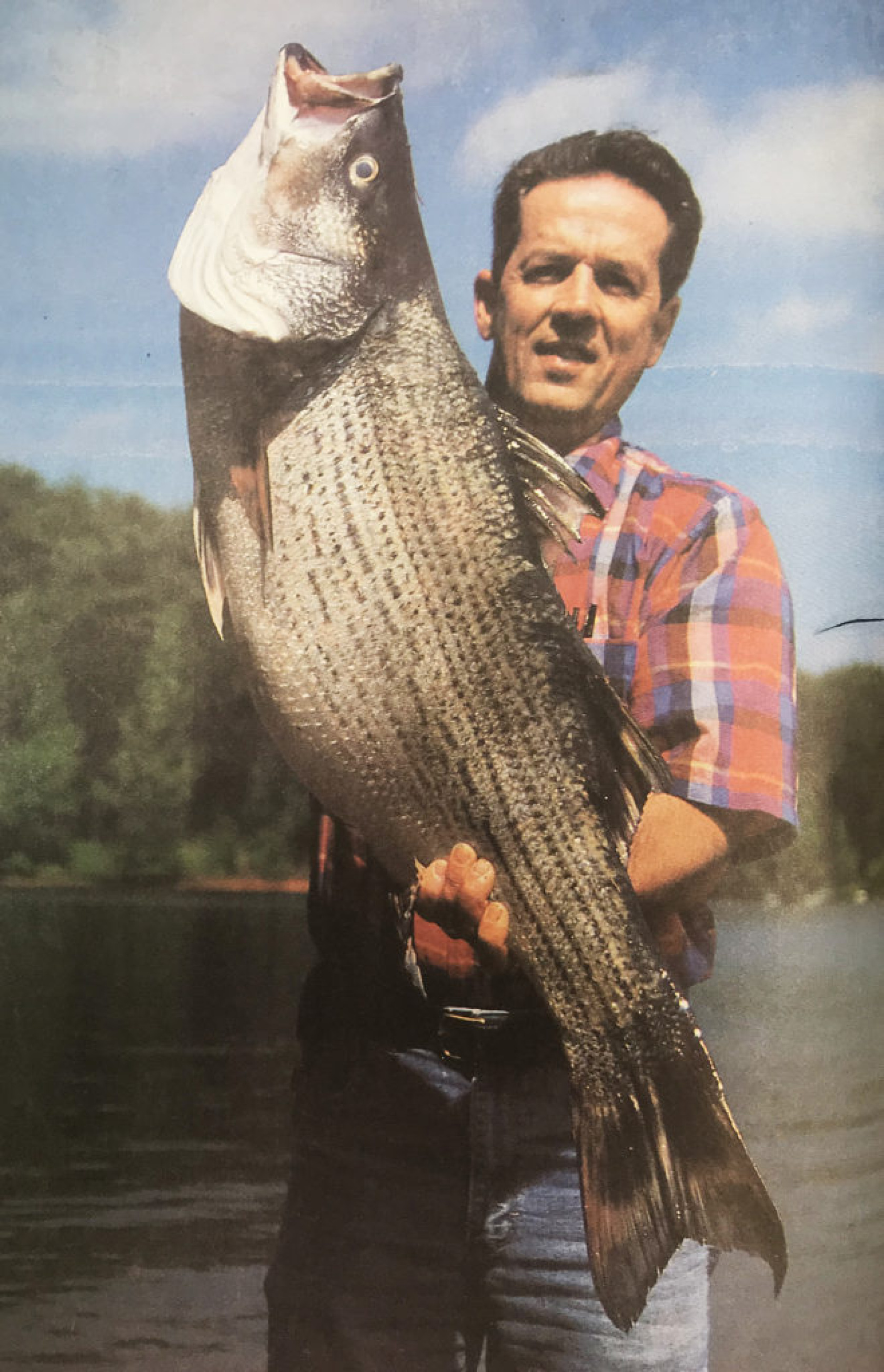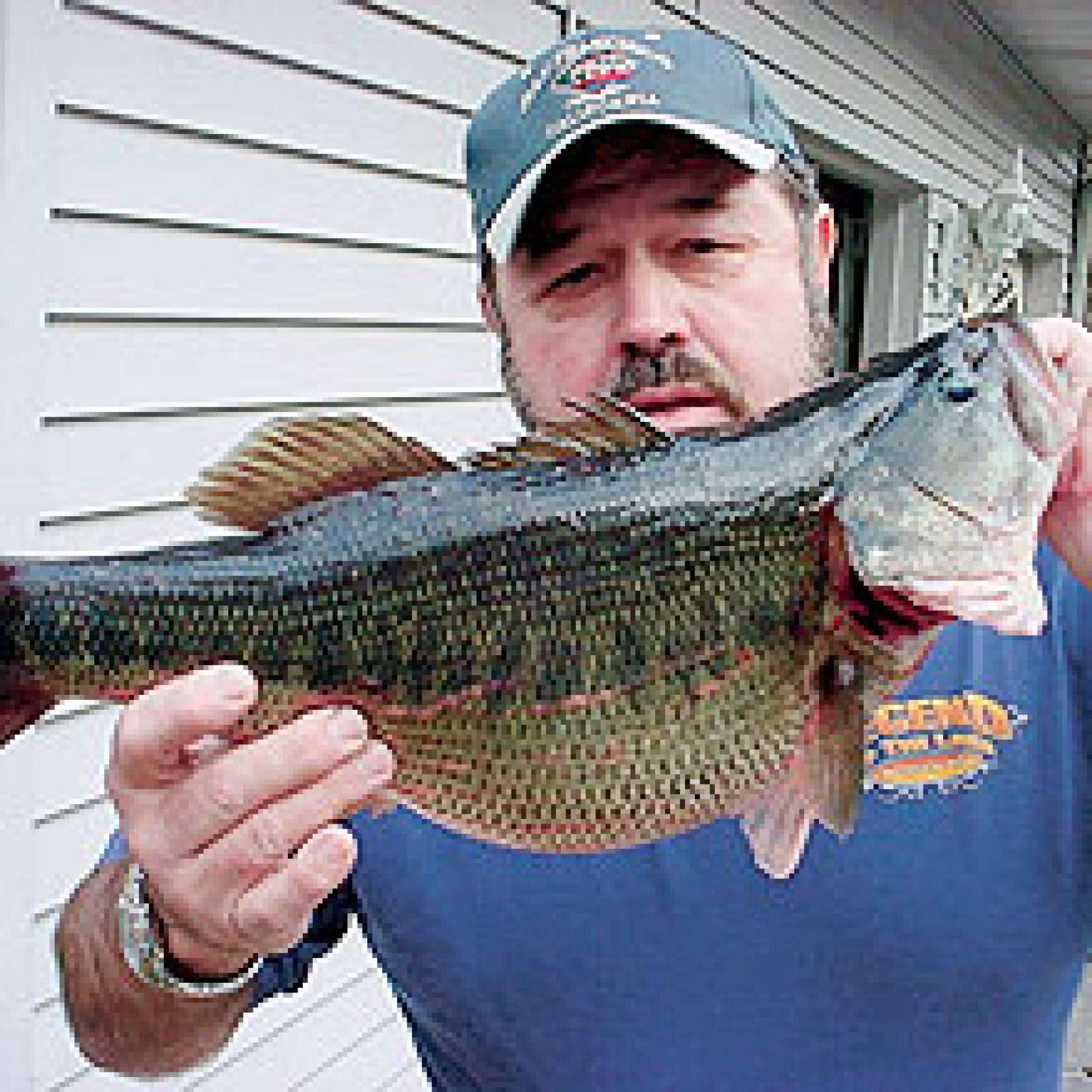Top 7 Georgia Bass Fishing Records (2025 Updated)
When you hear about top-notch bass fishing, four states and their records usually come to mind: Alabama’s, Texas', Georgia’s and California’s bass fishing records. That's for a good reason. They're all big bass producers that have been setting some of the world's most impressive records, and any angler who has hopped a lure across their waterways knows just how exciting the bass fishing can be.
Today, we want to go over the Georgia bass fishing records. There's a lot of information you can glean from these records to help you improve your own bass fishing experience, and of course, there's some entertainment value to it if you're a die-hard fisherman.
Let’s get started.
1: George Perry: A Legendary Catch
We can’t talk about bass records without bringing up George Perry, let alone the records for the state he caught his legendary fish in. So, while this record has been beaten, we’re going to start the list off with it.
In 1932, George Perry was just an average small-town guy who decided to go fishing with his buddy. They were supposed to be working, but the fields they worked in got rained out, and they had to call it an early day. That's how they wound up at Lake Montgomery right after a rainstorm in the middle of the day.
George used a silver-colored ancestor to modern lipless cranks, and he and his friend were tossing their lures around an old stump they’d considered a go-to fishing spot for years. That’s when the 20-year-old Georgia farmer hooked into a record that would last for nearly a century.
On equipment that was in no way made to fight bass that large, without any intent to go record-breaking, George Perry wrestled 22 pounds and 4 ounces worth of a hard-fighting largemouth onto his rickety wooden boat.
Now, when this record was set, it wasn’t handled quite the same way as it would have been, today. In the 1930s, bass fishing wasn’t really a sport like it is, today. When people fished, the “Catch and Release” dogma that the vast majority of bass fishermen abide by today was not the case, and they were often looking to feed their families. As such, George took the massive fish, which was basically unheard of in the 30s, down to his local office to have it weighed, measured, and eventually, put down in the record books. After that, you can guess what happened to the fish. It’s safe to say it wasn’t put back to produce more goliaths in Montgomery Lake. There are no photos of George Perry with the fish, but he did have a replica made, and there are photos of that showing what the monster would have looked like had it been photographed on the spot.
George Perry's record lasted until 2006 when Mac Weakly caught a 25-pound 1-ounce largemouth in California, although that fish was not officially logged in the record books. A young Japanese fisherman has tied with George Perry officially, though. Manabu Kurita reeled in a bass in Japan that was thought to officially beat the record. Unfortunately, it was 22 pounds and 5 ounces. While slightly larger than Perry's 22-pound 4-ounce bass, the world record book requires a difference of at least 2 ounces. It's also worth noting that Japan's sports lakes are stocked and designed to produce trophy bass, so, it's a bit different than a country boy pulling a hog out of a random watering hole that naturally maintains itself.
Despite the record being broken unofficially and tied officially on the global scale, Georgia has never produced bass of that size since.
Beyond that, there isn't too much more to say about Perry's record, but he did make everything bass fishing revolves around today possible. After his world-record catch was entered into a Field and Stream magazine contest with the measurements he took down at the post office, the magazine started recording weights, and eventually, the IGFA was born. In a way, he triggered official record-keeping, and the sport we all know and love has gotten where it is because of that. Some would even say that the nationwide popularity, and eventual global renown, are partly responsible for bass fishing growing in popularity and being taken seriously since the days of it being a simple farm boy pastime.
2: Joseph McWhorter: Shoal Bass Record Shattered
When you look at bass fishing, you usually see a lot about largemouth bass. There's a reason for that. They fight hard, require skill when you start catching bigger fish and can grow to tremendous sizes. However, there are plenty of other bass in the world.
Take the shoal bass for instance. It’s typically lighter than a largemouth, has its own coloring patterns and physical traits, and isn’t as widely targeted by sport fishermen, but it’s a hard-fighting bass with a dedicated community of fishermen targeting it.
Well, Georgia’s knack for long-standing bass records rings true for shoal bass, too. It took 45 years, but Joseph Whorter crushed the previous 1977 record of 8 pounds 3 ounces with an 8-pound and 2-ounce shoal bass on December 23, 2021.
Joseph caught the record-breaking bass at Chattahoochee. Information regarding the lure, gear, and method used to make the catch is unavailable for the time being.
Image source: Georgia Outdoor News
3: David Hobby: Hybrid Bass Record
Hybrid bass frequently get larger than largemouth, but they’re not as often recognized by the sport fishing world. Georgia does have a state record for this behemoth of a bass species, though.
David Hobby set the current record in 1995 with a 25.8-pound hybrid bass caught on a rod and reel. Being a more modern record, you can find the official state photos of the catch. The fish was caught at Lake Chatuge.
For those of you who might not know much about hybrid bass, since they're in no way as popular as largemouth or Smallies, they're what you get when a white bass and a striped bass mate. They're extremely hardy fish because of this, and they can survive in waters that combine with saltwater bodies if need be. Sometimes, hybrid bass are intentionally bred and added to ponds because of those traits, but they can also occur naturally under the right conditions.
4: Steve Williams: Redeye Bass Record
Redeye bass aren’t what one would consider a sport fish, unless you’re into pan fishing, and believe us, there is nothing wrong with that with the right equipment. With some ultralight gear and right bass fishing lures, even these little guys can put up a good fight and snap some lines.
Also, while the larger sport fishing community likes to turn its nose up at these smaller species, Georgia does have a record for them.
Steve Williams holds the current Georgia redeye bass record with a 3-pound 7-ounce bass he caught at Lake Hartwell in 2004. Now, that doesn’t sound huge, but consider the fact that these tiny bass cousins are often no bigger than the bluegill you take your kids out to fish for, 3 pounds sounds a lot bigger now, doesn’t it?
5: Wayne Holland: Spotted Bass Record
Spotted bass aren’t as popular as largemouth bass, but they are probably 3rd place in the bass fishing community. They’re fairly average in size, put up a fight worthy of the bass reputation, and their unique color patterns make them stand out.
In Georgia, the spotted bass record is held by Wayne Holland for an 8-pound 2-ounce bass he lipped at Lake Burton. It was a fat-bellied spotted bass caught in 2005, and the record has held firm for the last 17 years.
Image source: Game & Fish
6: Jack Hall: Smallmouth Bass Record
Smallmouth bass, or Smallies, are the second most popular bass among sport fishermen. Obviously, the highly lauded largemouth takes first place. However, while Smallies are lighter and don't have the enormous gill flares of largemouth bass when they blow up, they do put up a mean fight, and some might even say it takes a little more skill to trick these picky eaters.
In Georgia, Jack Hall has held the state record for Smallies since 1973. The angler pulled in a 7-pound 2-ounce Smallie from Lake Chatuge. There are no photos of the fish, but that can be blamed on the time period it was caught during. Sport fishing was really just taking off and gaining widespread popularity at the time, and camera technology certainly wasn’t as advanced as today. Luckily, we have the DNR’s record books to remember this almost 50-year-old record by.
7: Tied Record Holders: Striped Bass
Finally, if you want truly enormous fish the striped bass is the way to go. They make largemouth bass look like bluegill in comparison. Although, they’re not quite as common nationwide, and thus, they aren’t as popular.
The current Georgia striped bass record is a whopping 63 pounds.
The first record holder is Kelly A. Ward who caught his bass at Oconee River in 1967. However, Terry McConnell caught an equally-sized striped bass at Lake Richard B. Russel in 2009.
As we said before, Georgia's records tend to be long-standing. While the bodies of water in Georgia have a habit of cranking out giant fish, once one that is truly remarkable gets lipped, it usually isn't beaten for decades. When somebody finally beats this tied record and crowns a new single record holder for striped bass, it'll be a big deal.
What You Can Learn from This
If you’re a die-hard bass fisherman, just knowing how big your favorite sport fish can get is enough to get you giddy like a child again, but there is actually quite a bit of learning potential found in the record books.
First, take a look at George Perry's record. While taking a big fish to the post office and then submitting your measurements to a magazine later on probably wouldn't be taken seriously by today's standards, a 20-year-old farmer simply looking to have some fun after getting rained out of work for the day has now held the Georgia state record for more than 90 years, and the only person to OFFICIALLY tie with him is across the globe fishing in sport fisheries. The only person to break his record had too much controversy surrounding the catch and decided not to have it officially recorded to avoid any problems in the community or risking the catch's health with prolonged measuring processes.
A very simple fisherman, who wasn't using any of the expensive equipment that fills modern tackle boxes, has pretty much dominated the world of bass fishing for a century. You don't need $30,000 boats, a collection of custom rods, and the latest high-tech lures to nab massive bass. You need skill, the right spot, right bass fishing pattern, and a little luck.
Speaking of the right spot, these records prove that some places produce fish more efficiently than others. Lake Chatuge is on this list numerous times, but Lake Montgomery, George Perry’s fishing hole, is only on it once. Of course, Chatuge is on it for other species, but those are bass records. If you were to target any of Georgia’s records, Chatuge would probably be the best place to start.
Finally, one bit that fishermen don't take into account is that there are more records out there than just largemouth bass. As you can see, Smallies, redeye bass, striped bass, hybrid bass, and various other bass species are all recognized by the record books. It doesn't hurt to target Perry's record, but every species you catch in an above-average weight class might just put you in the record books, don't hesitate to contact the DNR or the other official measurement officials in Georgia if you pick up a giant redeye or Smallie.
Get Tips and Tricks with BassForecast
If you’re going to head out in search of your own record-shattering fish after learning about Georgia bass fishing records, you’re going to have to build your skills and know what you’re doing. BassForecast has the guides to help you improve your technique, and we offer the best fishing app that puts the technology on your side while you're hunting records and having a blast.



.png)
.png)